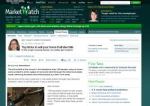Exchange traded funds are one of the most popular vehicles that investors are using to buy stocks. Passive funds tracking U.S. stocks are gaining popularity as equity markets are on the mend, according to BlackRock’s chief executive.
“What we are seeing, and the industry overall, are still a majority of flows moving more into passive,” Larry Fink, CEO of New York-based BlackRock (NYSE: BLK), said in a recent report. [BlackRock Sees Secular Shift to ETFs]
BlackRock’s ETF suite iShares had attracted $759 billion in ETF inflows. Stock ETFs for iShares drew in $30.1 billion in inflows over the fourth quarter of 2012 alone, reports Alexis Leondis for Bloomberg. Active stock funds lost $5.4 billion over the same time period. [ETFs Boost BlackRock Profit]
Last week, equity based mutual funds drew in $17.8 billion in new money, the highest since 2007. The U.S. equity market had been dodged since the financial crisis in 2008. Institutional investors generally favor ETFs, while retail investors still favor mutual funds. This pattern is expected to tilt with more individual investors using ETFs as the tax benefits and lower fees become more evident.
“Analysts agree the big sums moving into stock-based mutual funds represent a change from last year, when investors yanked a total of $129 billion out of equity funds while pouring $258 billion into fixed-income funds,”Johanna Bennett wrote for Barron’s.
“I’m not here to say people are bullish and rerisking,” Fink said. “If they’re not bearish on the world, but not bullish, they probably have overallocation to bonds, and they’re probably looking and re-orienting that.” Continue reading







